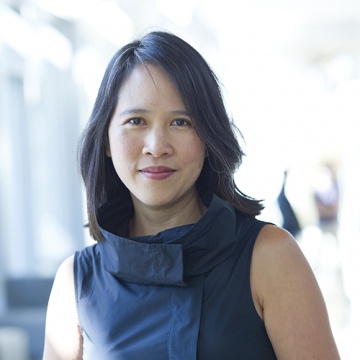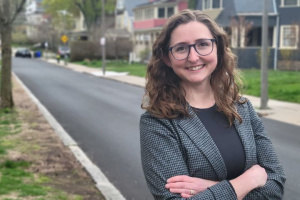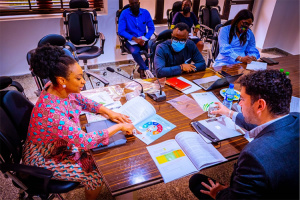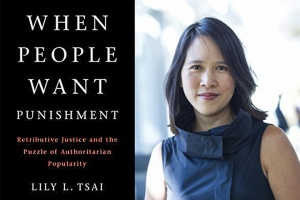
Lily L. Tsai
Ford Professor of Political Science
Class of 1960 Innovation in Education Fellow
Political behavior of development; political economy of development; state-society relations; governance; corruption; accountability; political participation; citizen engagement; Chinese politics; African politics.
Biography
Lily L. Tsai is the Director and Founder of the MIT Governance Lab (MIT GOV/LAB) and the Ford Professor of Political Science at the Massachusetts Institute of Technology (MIT), as well as the former Chair of the MIT Faculty. Her research focuses on accountability, governance, and political participation in developing contexts, particularly in Asia and Africa. In 2014, she founded MIT GOV/LAB, a group of social and behavioral scientists and design researchers who develop and test innovations in citizen engagement and government responsiveness. By focusing on how and why citizens become active in engaging their governments, Tsai aims to bridge researcher and practitioner communities by developing learning collaborations that can respond to governance challenges using empirical evidence in real time. Tsai has written two books, When People Want Punishment: Retributive Justice and the Puzzle of Authoritarian Popularity, and Accountability Without Democracy: Solidarity Groups and Public Goods Provision in Rural China, as well as articles in The American Political Science Review, The Journal of Politics, Comparative Political Studies, Political Behavior, Comparative Politics, and World Development.
Research
Governance, accountability, and public goods provision
Using both quantitative and qualitative data, my research seeks to identify the factors that lead to better governmental performance and accountability for the provision of public goods and services such as education and basic infrastructure in developing countries. Such factors include processes of decentralization, the implementation of democratic reforms, informal institutions and nongovernmental actors, and economic development.
Social capital and civil society
Scholars and policymakers often argue for the promotion of civil society and social capital as necessary for development and democratic consolidation. My research suggests that different types of social capital and social groups – including those that link state and nonstate actors – may have positive as well as negative impacts on social and political outcomes.
Political attitudes and behavior in nondemocratic and transitional systems
Using a variety of approaches – survey research, case studies, in-depth interviews with individuals, and field experimentation – I seek to understand how and when relatively powerless individuals in developing countries and transitional political systems decide to participate in politics and articulate their interests.
Recent Publications
2023 “Taking Responsibility for Tomorrow: Remaking Collective Governance as Political Ancestors,” January, Daedalus vol. 152, no 1.
2023 “Uptake of COVID-19 vaccines and associated factors among adults in Uganda: a cross-sectional survey.” BMJ Open. With Rawlance Ndejjo, Nuole Chen, Steven Kabwama, Alice, Namale, Solomon Wafula, Irene Wanyana, Susan Kizito, Suzanne Kiwanuka, William Sambisa, and Rhoda Wanyenze.
2022 “What Makes Anticorruption Punishment Popular? Individual-Level Evidence from China.” Journal of Politics. With Minh Trinh and Shiyao Liu.
2021 “Using Public-Private Data to Understand Compliance with Mobility Restrictions in Sierra Leone.” In Urban Informatics for Future Cities. Springer. With Innocent Ndubuisi-Obi, Ziyu Ran, Yanchao Li, Chenab Navalkha, and Sarah Williams.
2020 “Building Credibility and Cooperation in Low-Trust Settings: Persuasion and Source Accountability in Liberia during the 2014-2015 Ebola Crisis.” Comparative Political Studies. With Benjamin Morse and Robert Blair.
2017 “Outspoken Insiders: Political Connections and Citizen Participation in Authoritarian China.” Political Behavior. 40, 3 (September): 629-657. With Yiqing Xu.
2017 “Public Health and Public Trust: Survey Evidence from the Ebola Virus Disease Epidemic in Liberia.” Social Science and Medicine. 172 (January): 89-97. With Robert Blair and Benjamin Morse.
“Constructive Noncompliance in Rural China.” Comparative Politics. April 2015.
2014 “Does Information Lead to More Active Citizenship? Evidence from an Education Intervention in Rural Kenya” (with Evan Lieberman and Daniel Posner). World Development, August.
2011 "Friends or Foes? Nonstate Public Goods Providers and Local State Authorities in Nondemocratic and Transitional Systems," Studies in Comparative International Development, January.
2010 "Quantitative Research and Issues of Political Sensitivity in Rural China," in Contemporary Chinese Politics: New Sources, Methods, and Field Strategies, edited by Allen Carlson, Mary Gallagher, Kenneth Lieberthal, and Melanie Manion, Cambridge University Press, July 2010.
2008 "Understanding the Falsification of Village Income Statistics," The China Quarterly, 196, December 2008.
2007 Accountability Without Democracy: Solidary Groups and Public Goods Provision in Rural China (Cambridge Studies on Comparative Politics, Cambridge University Press).
Winner of the 2007-08 Dogan Award from the Society of Comparative Research for the best book published in the field of comparative research.
2007 "Solidary Groups, Informal Accountability, and Local Public Goods Provision in Rural China," American Political Science Review, vol.101, no.2 (May), pp.355-372.
Teaching
| 17.850 | Graduate Scope and Methods |
| 17.869 | Political Science: Scope and Methods |
| 17.905 | Forms of Participation: Old and New |
| 17.952 | The Rise of the Modern State |
| 17.955 | Civil Society, Social Capital & the State in Comparative Perspective |
| 17.955 | State, Society, and Political Behavior in Developing Contexts |
| 17.962 | Second-Year Paper Seminar |
News
Biography
Lily L. Tsai is the Director and Founder of the MIT Governance Lab (MIT GOV/LAB) and the Ford Professor of Political Science at the Massachusetts Institute of Technology (MIT), as well as the former Chair of the MIT Faculty. Her research focuses on accountability, governance, and political participation in developing contexts, particularly in Asia and Africa. In 2014, she founded MIT GOV/LAB, a group of social and behavioral scientists and design researchers who develop and test innovations in citizen engagement and government responsiveness. By focusing on how and why citizens become active in engaging their governments, Tsai aims to bridge researcher and practitioner communities by developing learning collaborations that can respond to governance challenges using empirical evidence in real time. Tsai has written two books, When People Want Punishment: Retributive Justice and the Puzzle of Authoritarian Popularity, and Accountability Without Democracy: Solidarity Groups and Public Goods Provision in Rural China, as well as articles in The American Political Science Review, The Journal of Politics, Comparative Political Studies, Political Behavior, Comparative Politics, and World Development.
Research
Governance, accountability, and public goods provision
Using both quantitative and qualitative data, my research seeks to identify the factors that lead to better governmental performance and accountability for the provision of public goods and services such as education and basic infrastructure in developing countries. Such factors include processes of decentralization, the implementation of democratic reforms, informal institutions and nongovernmental actors, and economic development.
Social capital and civil society
Scholars and policymakers often argue for the promotion of civil society and social capital as necessary for development and democratic consolidation. My research suggests that different types of social capital and social groups – including those that link state and nonstate actors – may have positive as well as negative impacts on social and political outcomes.
Political attitudes and behavior in nondemocratic and transitional systems
Using a variety of approaches – survey research, case studies, in-depth interviews with individuals, and field experimentation – I seek to understand how and when relatively powerless individuals in developing countries and transitional political systems decide to participate in politics and articulate their interests.
Recent Publications
2023 “Taking Responsibility for Tomorrow: Remaking Collective Governance as Political Ancestors,” January, Daedalus vol. 152, no 1.
2023 “Uptake of COVID-19 vaccines and associated factors among adults in Uganda: a cross-sectional survey.” BMJ Open. With Rawlance Ndejjo, Nuole Chen, Steven Kabwama, Alice, Namale, Solomon Wafula, Irene Wanyana, Susan Kizito, Suzanne Kiwanuka, William Sambisa, and Rhoda Wanyenze.
2022 “What Makes Anticorruption Punishment Popular? Individual-Level Evidence from China.” Journal of Politics. With Minh Trinh and Shiyao Liu.
2021 “Using Public-Private Data to Understand Compliance with Mobility Restrictions in Sierra Leone.” In Urban Informatics for Future Cities. Springer. With Innocent Ndubuisi-Obi, Ziyu Ran, Yanchao Li, Chenab Navalkha, and Sarah Williams.
2020 “Building Credibility and Cooperation in Low-Trust Settings: Persuasion and Source Accountability in Liberia during the 2014-2015 Ebola Crisis.” Comparative Political Studies. With Benjamin Morse and Robert Blair.
2017 “Outspoken Insiders: Political Connections and Citizen Participation in Authoritarian China.” Political Behavior. 40, 3 (September): 629-657. With Yiqing Xu.
2017 “Public Health and Public Trust: Survey Evidence from the Ebola Virus Disease Epidemic in Liberia.” Social Science and Medicine. 172 (January): 89-97. With Robert Blair and Benjamin Morse.
“Constructive Noncompliance in Rural China.” Comparative Politics. April 2015.
2014 “Does Information Lead to More Active Citizenship? Evidence from an Education Intervention in Rural Kenya” (with Evan Lieberman and Daniel Posner). World Development, August.
2011 "Friends or Foes? Nonstate Public Goods Providers and Local State Authorities in Nondemocratic and Transitional Systems," Studies in Comparative International Development, January.
2010 "Quantitative Research and Issues of Political Sensitivity in Rural China," in Contemporary Chinese Politics: New Sources, Methods, and Field Strategies, edited by Allen Carlson, Mary Gallagher, Kenneth Lieberthal, and Melanie Manion, Cambridge University Press, July 2010.
2008 "Understanding the Falsification of Village Income Statistics," The China Quarterly, 196, December 2008.
2007 Accountability Without Democracy: Solidary Groups and Public Goods Provision in Rural China (Cambridge Studies on Comparative Politics, Cambridge University Press).
Winner of the 2007-08 Dogan Award from the Society of Comparative Research for the best book published in the field of comparative research.
2007 "Solidary Groups, Informal Accountability, and Local Public Goods Provision in Rural China," American Political Science Review, vol.101, no.2 (May), pp.355-372.
Teaching
| 17.850 | Graduate Scope and Methods |
| 17.869 | Political Science: Scope and Methods |
| 17.905 | Forms of Participation: Old and New |
| 17.952 | The Rise of the Modern State |
| 17.955 | Civil Society, Social Capital & the State in Comparative Perspective |
| 17.955 | State, Society, and Political Behavior in Developing Contexts |
| 17.962 | Second-Year Paper Seminar |






